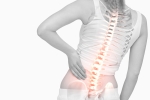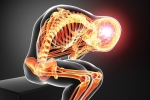Home »
Blog » Pain Management
| Stem Cell, PRP, Acupuncture in Queens & Long Island, New York
Pain Management | Stem Cell, PRP, Acupuncture in Queens & Long Island, New York
In some cases of osteoporosis, one or more vertebral bones can become so weak that they cannot fully support their load and develop tiny cracks. This type of fracture, called a vertebral compression fracture, can be painful and sometimes leads to worsening symptoms, such as tingling, numbness, weakness, or spinal deformity (kyphosis). Fortunately, you can take steps to lower your risk for vertebral compression fractures, as well as seek treatment if one occurs.
Read more
Overview - Cannabidiol (CBD) is a type of cannabinoid, a chemical found naturally in cannabis (marijuana and hemp) plants. CBD doesn’t cause the “high” feeling often associated with cannabis. That feeling is caused by tetrahydrocannabinol (THC), a different type of cannabinoid. Some people with chronic pain use topical CBD products, in particular CBD oil, to manage their symptoms.
Read more
When pain is at its worst, we’re tempted to try just about anything to get some relief, including procedures like nerve blocks or injections. But before you jump into a new procedure, you need to understand both the risks and the potential benefits. The world of nerve blocks and spinal injection procedures for treating pain is sometimes referred to as interventional pain management, and it has played a fundamental role in how doctors treat pain for decades. These types of treatments are typically done with special imaging techniques, like live fluoroscopy, and focus on applying local anesthetics and/or cortisone around symptomatic parts of the body, like irritated nerves.
Read more
When upper back pain has lingered or not responded to rest and other self-care methods, a medical professional may be needed to develop a treatment plan that can reduce the pain.
Nonsurgical Medical Care for Upper Back Pain - Some of the more common medical treatments for upper back pain include:
Physical therapy. A physiatrist, physical therapist, or other qualified medical professionals can design a physical therapy program to meet the patient’s specific needs. Most physical therapy programs for upper back pain focus on strengthening and stretching the upper back’s muscles, as well as neck muscles above and core muscles below. Physical therapy starts gradually and typically progresses over a period of a few weeks or months, at which point the patient can switch to a maintenance program at home.
Read more
According to the American Academy of Pain Medicine, chronic pain affects approximately 100 million U.S. adults and costs $560 to $635 billion per year in direct medical treatment costs and lost productivity. Talk about a painful pill to swallow. Exercise is a common treatment for chronic pain. Depending on your current state of health, it may help decrease inflammation, increase mobility, and decrease overall pain levels, no additional medication required. Try a combination of the cardio, relaxation, stretching, and strength exercises below and you may feel some of your pain ease away over time.
Read more
Many chronic pain patients show up for their first appointment feeling misunderstood, frowned upon, or just not taken seriously. Most feel isolated on an island with no one else to understand or appreciate what they are going through. This sense of feeling misunderstood is partly due to the fact that there really isn’t a test that can detect and convey the complexities and impact of a pain experience, making the patient feel like they are on their own to prove how they feel.
Read more
If upper back pain develops without any signs of an emergency, most people can safely try to alleviate the pain on their own. Several self-care treatments for upper back pain exist. In some cases, a combination of one or more treatments is needed to help reduce the pain.
Read more
Treating chronic pain - Recognizing that chronic pain is a problem is the first step in finding treatment. Start by talking to your doctor about chronic pain symptoms. Together you can identify the source of the pain and come up with a comprehensive treatment plan that takes into account your overall health and lifestyle. Over-the-counter (OTC) and prescription medications are often used to manage pain. However, for many people, a combination of treatments is most effective.
Read more
As a doctor who sees firsthand the damage that chronic pain creates in people’s lives, I believe improving how we treat pain is the single most important public health challenge that we face but not because of the opioid crisis or the $ 600 billion spent each year on treating pain and lost productivity. From my perspective, chronic pain’s most devastating effect, hidden just below the surface of all the tragic stories, is its impact on our most essential core need love.
Read more
The course of upper back pain and how to treat it depends on the underlying cause of the condition. Even in cases where it seems obvious what started the upper back pain, such as an injury from a fall, the specific source of pain within the body can sometimes remain elusive. Regardless of whether the exact source of upper back pain can be determined, it helps to know the various potential causes in order to better narrow down which treatments may be best.
Read more
Love this Post? Spread the World






















